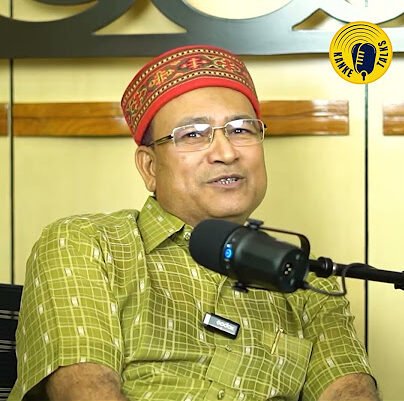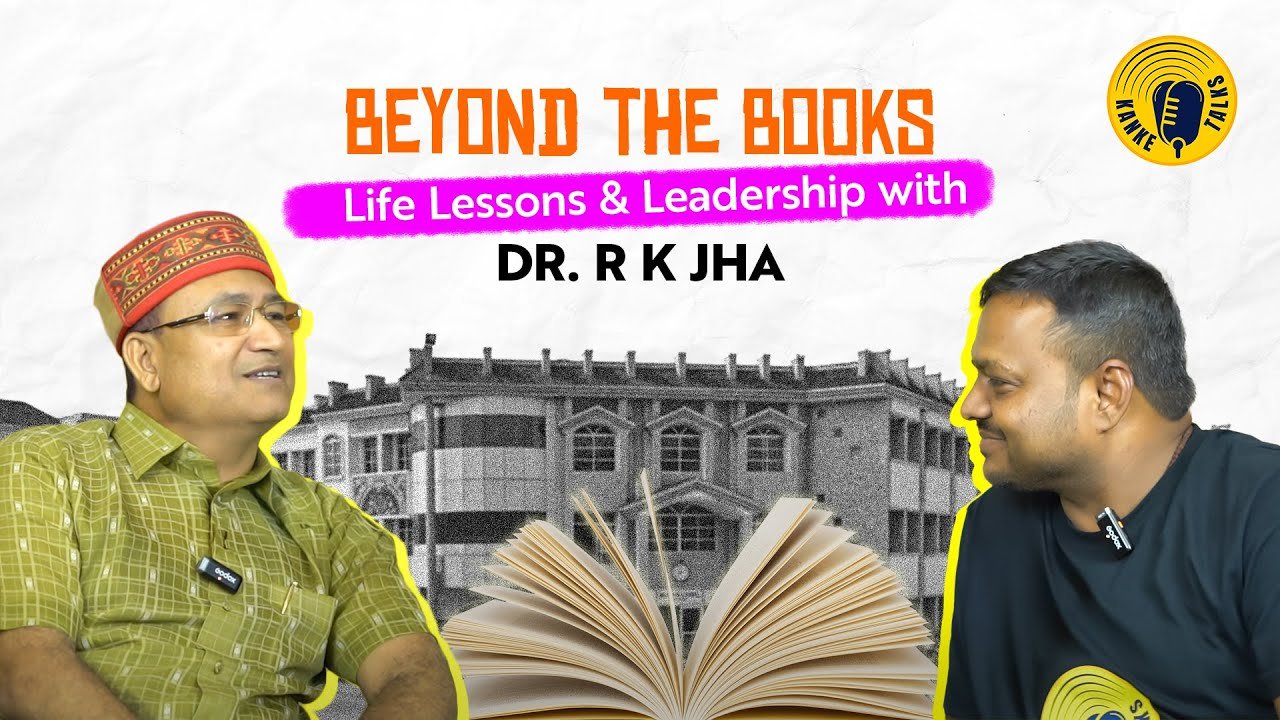In a world where credentials and titles often create distance, Dr. R.K. Jha, Principal of Delhi Public School, Ranchi, stands out not just as an educator but as a deeply grounded human being. His journey from a modest village upbringing to leading one of Jharkhand’s premier educational institutions isn’t just inspiring — it’s a lesson in humility, introspection, and purpose.
He doesn’t speak like a conventional head of a prestigious school. He speaks like a teacher, a storyteller, and sometimes, like a philosopher.

A Childhood with Simplicity, Not Scarcity
Dr. Jha’s memories of childhood are vivid and affectionate. He recalls his mother—a highly educated, deeply spiritual woman who gave up her own professional aspirations to raise her children. “She was organized and principled. She didn’t want riches—just to see her children grow well,” he reflects.
His father, too, was a man of modest means but great dignity. Despite not chasing material comforts, his parents created a home rich in values, curiosity, and conversation.
Even as a child, R.K. Jha noticed that happiness didn’t come from possessions. He remembers a neighbor buying a car, and the awe it inspired in others. Yet he also remembers a carefree village boy riding a buffalo with the swagger of a king. “That image stayed with me—happiness is a mindset,” he says.
Lessons from the Streets, Not Just Books
While studying, young Jha observed a troubling contrast—students with vast resources often lagged behind those who had none but showed fierce determination. “I saw a rickshaw puller’s son who studied under a lamp and passed. Another boy had everything and still failed. That stayed with me.”
This observation shaped his lifelong belief: intellect, not inheritance, defines potential. He stresses that three factors shape a child—inheritance, environment, and personal instinct. “Even twins differ,” he says. “A child chooses the red toy, another the yellow. That’s instinct.”
The Making of a Teacher
Before he became a principal, Dr. Jha was—and remains—a teacher at heart. A physicist by training, he sees science in life’s every moment. “Everything can be explained—frustration, success, curiosity—like principles of energy transfer.”
But he also blends science with soul. “Children are like blank canvases. You can paint beauty or despair on them. That’s why parenting and teaching are sacred roles.”
His teaching philosophy is clear: Education must be holistic. Not just about marks or medals—but about shaping human beings with values. “We don’t want factories that produce toppers. We want complete humans—ones with kindness, curiosity, and courage.”
The Evolving Face of Education
Dr. Jha has witnessed the evolution of education—from an era when getting a BA was prestigious, to today’s obsession with percentile scores, AI tools, and high-speed learning. He acknowledges the pressure this new world brings. “We teach children to stretch the sheet beyond their feet—to chase big dreams. But we must also teach them balance. Ambition without stability leads to burnout.”
He’s wary of overemphasizing degrees. “You may have ten certificates, but can you write a decent application? Can you communicate? Can you live with dignity?”
On AI, Natural Intelligence, and the Future
As AI and digital tools dominate the discourse, Dr. Jha reminds us not to confuse speed with wisdom. “Computers are fast, but humans are intuitive. Machines follow patterns. We, on the other hand, create them.”
DPS Ranchi has begun incorporating AI in its curriculum, but not without context. “AI should support learning, not replace it. The brain must remain the master, not the slave.”
He is particularly concerned about digital distractions—how social media, viral videos, and digital fantasies are replacing real conversations, empathy, and focus. “Children film disasters instead of helping. They record a peer lighting a cigarette instead of stopping him. This is not curiosity—it’s collapse.”
Challenges of Leading DPS Ranchi
Being Principal of a school like DPS Ranchi comes with prestige—and pressure. “There’s an expectation that every child must excel, every parent must be satisfied, and every result must be top-notch,” he says. “But the truth is—I cannot fulfill everyone’s dreams. That gap between expectations and reality creates tension.”
He admits that DPS’s reputation also becomes its burden. “People think this school is perfect. They fight for seats. But they forget—education is a journey, not a transaction.”
Still, he takes pride in the trust families place in the school, often saying, “It is my privilege and my challenge. I want to give every child what I got—not things, but values.”
His View on the National Education Policy
Dr. Jha is cautiously optimistic about the National Education Policy (NEP). “It talks about skill-based learning and flexible education—and that’s needed. But implementation is the real test. We can’t just change the syllabus. We need to change mindsets.”
He recalls how degrees were once passports to jobs, but no longer. “Now, it’s about skills—communication, critical thinking, ethics. That’s what employers want. That’s what schools must build.”
A Life of Balance, Not Ego
Despite his stature, Dr. Jha doesn’t carry ego. “I don’t think I’m above anyone. The driver, the teacher, the parent—we’re all part of the same system. We must respect each role.”
His view on self-respect vs. arrogance is powerful: “Every human deserves dignity—even a beggar. But the moment self-respect turns into ego, destruction begins. Ravana’s story is proof.”
Final Words: A Message to Students and Parents
To parents, he says: “Don’t compare. Every child is unique. Understand their instinct, their pace, their potential. Raise them with patience, not pressure.”
To students: “Work hard, but with joy. Chase dreams, but stay rooted. Use your full potential—and never measure yourself with someone else’s ruler.”
And to all educators: “Let’s raise not just intelligent children—but good human beings. That is the true test of education.”

No responses yet